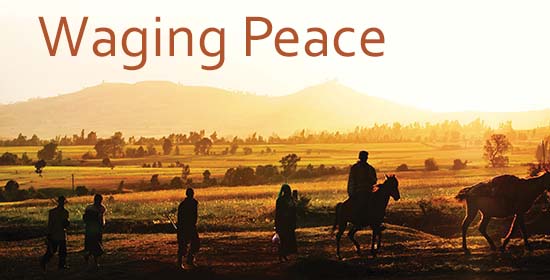 |
 |
| current issue |  |
past issues |  |
send a letter/news |  |
address update |  |
advertise |  |
about us |  |
alumni home |
For more than 50 years, UNH alums serving in the Peace Corps have been gaining perspective on the world—and their place in it. By Suki Casanave '86G See also: After the Peace Corps: Stories of two UNH faculty members Peace Corps Journal: UNH alums tell their stories, in their own words In the spring of 2012, when Ellen Paquette '72 arrived in Tunis, a city of white buildings set against a glittering Mediterranean Sea, she was eager to get to work. This was something she was good at—starting a new job in a foreign country. Something she'd done many times during her nearly 40 years in the Peace Corps. This time, Paquette had been appointed country director for Tunisia, where the program was reopening after 15 years, and she was hopeful about the work ahead as she settled into her office in the capital city.
During the summer months, as she began interviewing prospective staff members, the air was sweet with the scent of Arabian jasmine mingled with cumin and coriander and other spices sold in the open-air markets. People she met at social events often interrupted her when they learned what she was doing, insisting on speaking to her in English: "Welcome back!" they'd say, embracing her warmly. "Everyone was happy," Paquette says, "to have the Peace Corps back in Tunisia." And then, on Sept. 11, 2012, a bomb exploded at the American Embassy in the city of Benghazi in nearby Libya. The ambassador and three other Americans were killed. In Tunis, too, the streets were noisy with rioters who breached the embassy walls, destroying buildings and vehicles. Within hours, the Peace Corps had orders to evacuate. Paquette, who had been in Washington, D.C., for a conference, worked with the Tunisian staff from afar as she waited for clearance to return. Weeks stretched into months as the unrest continued. Meanwhile, all of her personal belongings—as well as her dog—remained in Tunisia. Resilience in the midst of sudden change has been part of Paquette's job description ever since she embarked on her first Peace Corps assignment in 1972. Brimming with idealism, the new college graduate was proud to be representing the United States as an overseas volunteer. "It was something I'd wanted to do since eighth grade," says Paquette, who had been inspired by John F. Kennedy's vision of legions of American volunteers working for peace in countries around the world. Today, Paquette's idealism, tempered by experience and wisdom, remains intact. "I always felt compelled to help people improve their lives," she says, "which is just what the Peace Corps is all about." Paquette is one of nearly 700 UNH alumni who have followed the Peace Corps path since the organiztion was established by executive order in 1961. "UNH is a great Peace Corps school," says Elizabeth Chamberlain, the public affairs specialist in the Peace Corps' New England office. "It offers training in all the skill sets our host countries are looking for—agriculture, the environment, health care, and education." The university also attracts students who have what it takes to be good volunteers, she adds, noting that UNH has been among the top 25 volunteer-producing schools in its size category for the past 10 years. "You have to be someone who wants to make a difference, who likes tangible results, and who is willing to step out of your comfort zone." In fact, signing on as a Peace Corps volunteer often means stepping into a job that's nearly impossible to define, ultimately determined in part by the initiative and talents of the volunteers themselves. Cement mixing and knitting, bike riding and basketball have all come in handy for UNH alums, along with more standard skills like teaching languages, writing grants, and creating economic development plans. Volunteers, who must commit for two years, tackle projects requested by the host community, working side by side with locals. This people-to-people philosophy is distinctly different, Paquette notes, from the big top-down projects that sometimes have characterized foreign aid programs in the past: shiny new American tractors left to rust in a field, for example, because no one knows how to fix them, the clinic that gets built—but lacks anyone to staff or stock it. |
blog comments powered by Disqus


